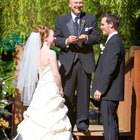Marriage is one of seven sacramental rites performed in the Episcopal Church. It is therefore crucial that a couple wishing to get married in the Church understand the significance of the sacrament and the level of commitment to God and the Episcopal Church necessary to proceed with an Episcopal wedding.
Become a baptized Christian if you are not already. It is required that one member of the engaged couple be a baptized Christian since Episcopal marriage is a Christian sacrament that represents the union of Christ and the Church.
Join an Episcopal Church if you don't already belong to one. Many congregations require membership and church participation of one member of the couple as a precondition for marriage. If you are not interested in joining a church, call local congregations to discuss membership requirements.
Call your church of choice and make an appointment with the parish priest for an interview. Be prepared to discuss your church history, especially baptism, your intended date of marriage and prior marriages, if applicable.
Provide proof of baptism and dissolution of any previous marriages to the parish priest. You must be separated or divorced for one year before getting married in the Episcopal Church.
Confirm your preferred wedding date with your priest. If you have a previous marriage, you may have to wait five months to get married in the Episcopal church, as your marriage requires special permission from a bishop. You may not get married in the Episcopal Church during the season of Lent.
Make appointments for premarital counseling sessions with your parish priest. You will have to attend at least three private, one hour sessions. Your priest may refer you to other professional counseling services depending on his assessment of your preparedness for marriage.
Plan the wedding ceremony with the parish priest. You will have a limited number of scripture readings, prayers, and vow formats to choose from. You will also need to decide whether you want to incorporate the sacrament of communion into your marriage ceremony.
Related Articles

Role of a Godmother During a ...

How to Get Certified to Marry Couples

How to Get Ordained to Officiate a ...

How to File for Legal Separation in ...

How to Plan a Catholic Destination ...

Requirements for Getting Married in a ...

How to Become an Episcopal Priest ...

How to Have a Covenant Marriage Ceremony

How to Get a Christian Counselor ...

How to Get Married by the Justice of ...

How to Become a Legal Wedding Officiant ...

How to Get Married Without Witnesses

How to Plan a Catholic Wedding in Hawaii

How to Get a Copy of Annulment Records ...

How to Prepare a Church Charter

How to Get Married Without the Wedding

How to File a Marriage License

Can a Notary Marry Someone in Georgia?

Wedding Etiquette for a Pastor

How to Become a Nonreligious Wedding ...
Writer Bio
This article was written by the CareerTrend team, copy edited and fact checked through a multi-point auditing system, in efforts to ensure our readers only receive the best information. To submit your questions or ideas, or to simply learn more about CareerTrend, contact us [here](http://careertrend.com/about-us).